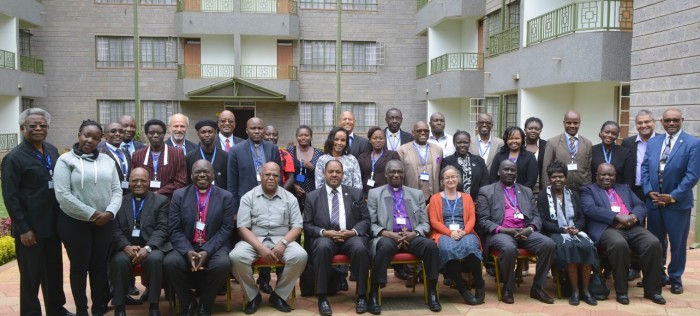
Photo: All Africa Conference of Churches (AACC)
On June 28th and 29th 2017, members of the ecumenical family along with national and international organizations gathered at the All Africa Conference of Churches in Nairobi, Kenya for the “Mobilisation of faith communities for overcoming hunger and sustaining justice and peace in the Horn of Africa”. The event brought together leaders from different faiths and denominations, as well as various Faith Based Organizations (FBOs) that are actively responding to the crisis in the Horn of Africa, as well as international organizations engaged in humanitarian coordination across the region.
The event, organised by the World Council of Churches (WCC), All Africa Conference of Churches, (AACC) ACT Alliance, World Vision International and the World Food Programme, encouraged further networking and collaboration opportunities between churches and other agencies, emphasizing the proactive role that churches and FBOs can play in influencing humanitarian, development, climate change and peace building agendas.
Participants focused on the root causes of the crisis, exploring durable solutions for conflict resolution and good governance. They worked towards strengthening their preparedness to respond to the famine crisis and identifying international advocacy strategies to increase available support for appeals in the region.
“We sang, we affirmed human dignity, stewarding the land, God’s Creation and caring for the most vulnerable,” said Will Postma, Executive Director of ACT Alliance member, The Primate’s World Relief and Development Fund (PWRDF). “Together, we affirmed the importance of transparent governance, of responding to climate change, of speaking out against conflict, partnering more with local government, [engaging] strategically with the media and more intentionally, to reach out to youth.”
A ‘Call to Action’
Together, faith leaders developed a ‘Call to Action’ aimed at overcoming hunger, promoting peace and justice and mobilizing support for the current appeals in the region. The Call to Action emphasizes, “as faith communities we are on our ‘Pilgrimage of Justice and Peace’ and are striving for the establishment of peace and the resolution of conflicts as one of our core mandates. Conflict is an unacceptable common denominator across all countries currently facing the risk of famine.” In addition, it notes that “it is imperative to continue addressing climate change and to be the stewards of environmental protection and to bring our moral authority to safeguard the integrity of creation.”
The Call to Action affirms a commitment to “encourage faith communities to be part of developing, implementing and sharing early warning and early action strategies and in documenting climate change best practices and coping mechanisms.”
“The Call to Action has the potential to advocate for international and regional support and commitment for the ongoing interventions through humanitarian appeals and finding sustainable solutions to the underlying causes of drought, conflict and climate change,” says Arnold Ambundo, ACT Alliance Programme Officer of the Africa Region. “The Call to Action further enhances the potential for ecumenical cooperation and partnerships in addressing contemporary challenges facing humanity.”
Catherine Njuguna, ACT Alliance’s Advocacy Officer based in Nairobi noted that a key component of the Call to Action is to “encourage faith based organizations to partner more with grassroots government structures, as well as national and regional structures, to make a difference.”
ACT Alliance appeals
ACT Alliance through its members in Kenya, Ethiopia, South Sudan and Somalia has been following and responding to the crisis on the Horn of Africa. Together, the Alliance has conducted a joint needs assessment and has participated in various strategic coordination sessions led by governments to develop national appeals to respond to the specific needs of a variety of sectors. The appeals in all four countries continue to need support.
In reference to the Somalia appeal, Reuben Chepkonga of Norwegian Church Aid (NCA) said, “the Alliance has been mobilizing resources both within and outside the ACT Appeal, however, currently only about 30% of the Appeal has been funded. The risk of famine in Somalia still persists and there is need to sustain and scale up humanitarian response to stop the situation from deteriorating quickly.” More information on the ongoing response and appeals of the ACT Alliance in the Horn of Africa can be found here.
Potential of responding as an Alliance
“The event enabled us to highlight the work that we are doing as ACT members to respond to the situation and also shows the strength we have in terms of access and capacity to sustain, and upscale our current response,” said Reuben.
Arnold further emphasized the significance of strong partnerships within the Alliance, “Working together allows ACT members to positively influence the situation on the ground, and to reach people in the communities to end hunger and bring about sustainable peace in this period of crisis.”
Will Postma of PWRDF said, “Collectively, we can learn so much from each other. We need to hear each others’ voices and be encouraged by work that is already happening.” He continued, “Churches and faith based organizations are well grounded in Biblical principles of justice and mercy and well placed at community levels to be important, credible actors and voices for change.”